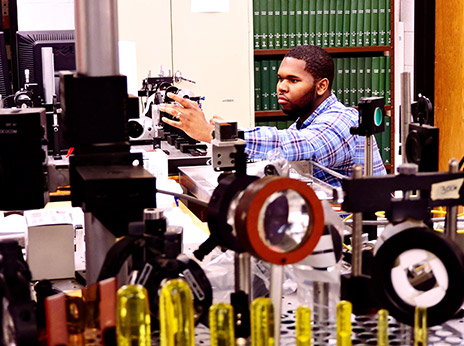Published on Sept. 1, 2016

As a physics major, undergraduate researcher Romanus Hutchins knows it can be challenging to fascinate people with formulas and engage them with equations.
“You can make science sound really interesting,” Hutchins says, “and you can also make it sound really boring.”
Through his experience as an Undergraduate Research Ambassador, Hutchins has learned how to speak about science in a compelling way as he gives presentations to Freshman Interest Groups, classes and student organizations.
“A big part of research is public speaking,” Hutchins says. “You have to communicate your ideas well enough so people can understand them. As an Undergraduate Research Ambassador, I’ve been able to sharpen my skills as a communicator.”
Michael Cohen, former assistant director of the Office of Undergraduate Research, encouraged Hutchins to become an ambassador when he recognized Hutchins’ enthusiasm for and motivation to conduct research.
Hutchins believes sound speaking skills and captivating presentations play a critical role in inspiring MU students to conduct their own research.
“I used to think research was this big thing that not a lot of undergraduates would be able to do,” Hutchins says. “As an ambassador, I know these opportunities exist, but not many people know about them. We have to let people know they have these opportunities, and they should take advantage of them.”
Hutchins started conducting research as a freshman. He studies how a laser that was first optically observed in 2007 interacts with biological materials such as human and animal tissue. He believes the laser could be used in detecting cancer cells.
In May of 2015, Hutchins presented his research at the Conference on Lasers and Electro-Optics (CLEO) meeting in San Jose, California. CLEO is the premier international forum for scientific and technical optics. Attendees, including Hutchins, shared research and ideas and networked with industry leaders.
Last spring, Hutchins used his speaking experience to present his research at the Missouri State Capitol in Jefferson City. He was part of a group of undergraduates that shared their research with legislators and members of the general public as part of University of Missouri Undergraduate Research Day at the Capitol.
“I’ve made it to a point where I could talk to anyone about my research,” Hutchins says. “I know these are busy people, and some of them may not be too interested in what I have to say, but part of my job is to help people understand my research and to make it interesting.”
Last summer, he took part in a research experience at Cal Tech.
Along with being an Undergraduate Research Ambassador, Hutchins participates in the Exposure to Research for Science Students (EXPRESS) Program, which is an Initiative for Maximizing Student Development (IMSD) program designed to encourage underrepresented minority students to pursue a career in biomedical research.
“There is a need for diversity in science,” Hutchins says. “There are always different approaches to different problems, and people with different backgrounds and experiences approach problems differently.”
Hutchins and other EXPRESS participants attend weekly professional development workshops and receive funding to gain research experience with a faculty mentor in the science department of their choosing.
“I always tell my students that we’re not Match.com,” Brian Booton, IMSD EXPRESS Program Coordinator, says. “We don’t match students with a research lab. We give them tools and resources to identify research groups that align with their interests and assist with the interviewing process.”
Within EXPRESS, Hutchins is founder and chair of the STEM Community Outreach Initiatives Committee. He and other members of the committee visit Lange Middle School in Columbia once a month to conduct an after-school program for students. Committee members work with MU faculty to create lesson plans and then guide the middle school students through a series of science experiments.
“Romanus has shown tremendous leadership in not only working with school administrators and science teachers to secure volunteer sites, but also in his ability to rally his peers to participate in a meaningful mentoring activity,” Booton says.